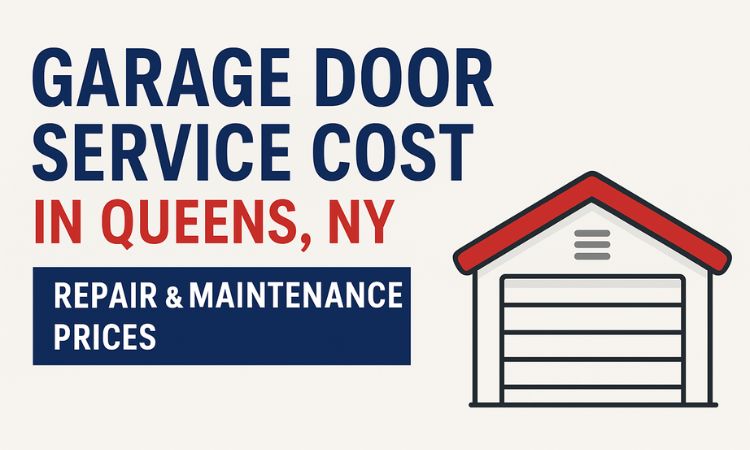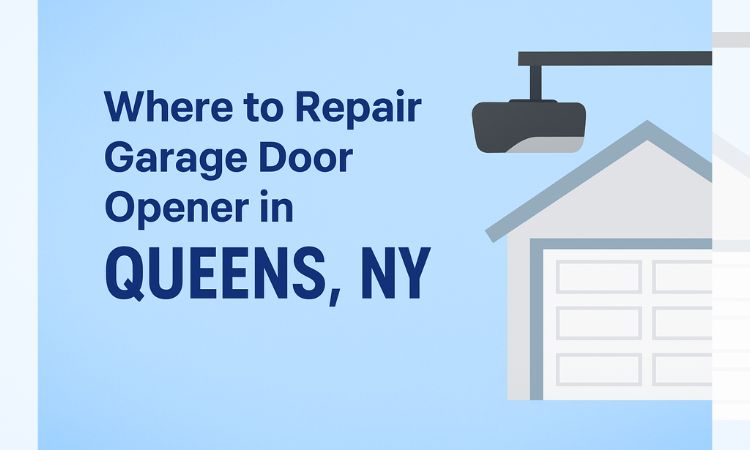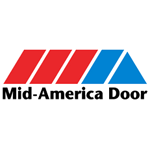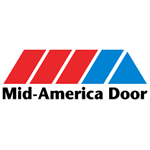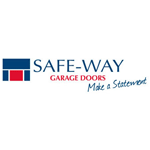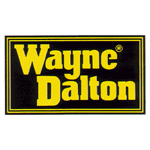When Your Garage Door Opener Stops Working
Imagine you’re about to leave for work, coffee in hand, and you press your garage door remote but nothing happens. The door doesn’t budge, the motor hums weakly, or maybe the keypad suddenly stops responding. This common homeowner headache can turn a busy morning into a stressful one.
A malfunctioning garage door opener is not just inconvenient; it can leave your car trapped inside, compromise home security, and even pose safety risks if you try to fix it yourself. These issues can be caused by electrical faults, mechanical wear, sensor misalignment, or even remote signal failure.
The good news? With the right help, it’s an easy problem to fix. In this article, we’ll explain where to repair garage door opener in Queens, NY, how to identify common issues, and what to look for when hiring a repair professional.
Need help right now? Contact Queens NY Garage Door Repair for fast, affordable, and reliable opener repair anywhere in Queens.
Understanding How Garage Door Openers Work
Before deciding where to get your opener repaired, it’s helpful to understand how it works. The garage door opener is a complex motorized system that powers the lifting and lowering of your door. It works hand-in-hand with other parts springs, rollers, and tracks to manage a door that can weigh hundreds of pounds.
Each component plays an important role in ensuring smooth operation:
- Motor Unit: This is the heart of your opener, generating power to lift or lower the door.
- Drive System: It transfers the motor’s motion using a chain, belt, or screw drive.
- Safety Sensors: Infrared sensors detect obstacles to prevent accidents.
- Remote and Keypad: These transmit wireless signals to open or close the door.
- Control Board: The “brain” of the opener that processes commands from remotes and sensors.
Because so many interconnected systems are involved, garage door opener failures can be caused by anything from worn gears to faulty wiring. Diagnosing the exact issue often requires a professional technician with the right tools and experience.
Common Garage Door Opener Problems That Require Repair
Your garage door opener is built for long-term use, but like any mechanical device, it’s prone to wear and tear. Below are some of the most frequent issues homeowners face along with what they usually mean.
Remote or Keypad Not Working
If your remote or keypad suddenly stops working, it might seem like a small problem, but it could point to a larger electrical issue. Before calling a technician, you can try a few quick checks:
- Replace the batteries in your remote or keypad.
- Reprogram the device following your opener’s manual.
- Make sure there’s no signal interference or blockage between the remote and opener.
If these steps don’t work, the receiver board inside the opener may need repair or replacement.
Opener Motor Humming but Door Not Moving
When you press the button and hear a humming sound but the door doesn’t move, it usually indicates a mechanical failure within the opener. Common causes include:
- Stripped nylon gears inside the motor assembly.
- A broken trolley or disconnected carriage in the drive system.
These parts wear out over time and need professional replacement to restore full function.
Door Reverses Before Closing
If your garage door starts closing but then reverses suddenly, it’s likely due to safety sensor misalignment. The opener’s sensors detect objects in the door’s path, and when misaligned, they falsely interpret an obstacle.
Other possible causes include incorrect force sensitivity settings or worn limit switches. A technician can easily realign and recalibrate the sensors to fix the issue.
Grinding or Squeaking Noises
Unusual noises often signal mechanical strain. While some noise is normal, excessive grinding or squealing can indicate:
- A worn drive chain or belt that needs tightening or replacement.
- Motor bearings wearing out due to age or lack of lubrication.
- Loose bolts or brackets inside the opener assembly.
Ignoring these noises can lead to more expensive repairs later on.
Opener Light Blinks but Doesn’t Operate
When your opener light blinks but nothing happens, it’s often displaying an error code. This can be caused by wiring problems, a malfunctioning circuit board, or sensor failure.
If you experience any of these issues, it’s time to call a trusted garage door opener repair expert in Queens, NY, like Queens NY Garage Door Repair for immediate assistance.
why Professional Opener Repair Is Always the Smart Choice
While DIY repair videos may look tempting, a garage door opener isn’t something you should tinker with yourself. These systems involve high-voltage wiring, mechanical gears, and safety sensors that require calibration. One wrong move could cause injury or make your door unsafe to operate.
Here are the main reasons to hire a professional:
- Accurate Diagnosis: Experts identify the real issue and prevent further damage.
- Genuine Parts: Technicians have access to manufacturer-approved components.
- Warranty Protection: Professional repairs often include parts and labor warranties.
- Safety: Experts know how to handle electrical connections and mechanical tension safely.
Queens NY Garage Door Repair provides same-day opener repair for all major brands, including LiftMaster, Genie, Chamberlain, and Craftsman, ensuring fast and lasting results.
Where to Repair a Garage Door Opener in Queens, NY
When deciding where to repair garage door opener, location and expertise matter. You want a team that’s nearby, responsive, and experienced. Let’s explore your best options and what to avoid.
Local Professional Service – Your Best Option
Hiring a local garage door repair company in Queens offers clear advantages: faster service, personal accountability, and community trust. Large national chains may take days to respond, but a local company can arrive the same day.
Here’s why Queens NY Garage Door Repair is the top choice for Queens residents:
- Locally based: We serve all Queens neighborhoods and nearby boroughs.
- Licensed & insured: Every technician is fully certified for your peace of mind.
- 24/7 emergency service: Available any time, day or night.
- Transparent pricing: No hidden fees or surprise charges.
- Experienced professionals: Skilled in diagnosing and repairing all opener models.
Avoid Big Box Stores or General Handymen
While it may seem convenient to call a handyman or large retailer, they often lack the specialized knowledge to handle complex opener systems.
Common problems with these options include:
- Incorrect diagnosis and temporary fixes.
- Outsourced technicians with limited experience.
- Delayed repairs or mismatched replacement parts.
Working with a dedicated garage door repair expert guarantees precision, quality, and long-term reliability.
How to Choose the Right Garage Door Opener Repair Company
Finding a trustworthy company to handle your repair is crucial. A reliable provider should have the credentials, experience, and customer service to ensure your opener is repaired safely and efficiently.
When searching where to repair garage door opener, look for these key traits:
- Licensed and insured technicians for guaranteed safety.
- Local presence and same-day service options.
- Experience with all opener brands and models.
- Transparent pricing with detailed estimates.
- Positive reviews and testimonials from local customers.
- Warranty coverage for added confidence.
Queens NY Garage Door Repair checks every box call us today for reliable opener repair anywhere in Queens.
Cost of Garage Door Opener Repair
The cost of repairing your garage door opener depends on the nature of the problem and the parts involved. However, homeowners in Queens can expect reasonable rates for professional service.
Here’s a general breakdown:
- Minor fixes (sensor realignment, remote reprogramming): $75–$150
- Gear or trolley replacement: $125–$250
- Motor or circuit board repair: $200–$400
Prices vary based on opener brand, damage severity, and whether emergency service is required.
At Queens NY Garage Door Repair, we always provide upfront quotes and no hidden fees so you’ll know exactly what to expect before any work begins.
Should You Repair or Replace Your Garage Door Opener?
Sometimes it’s more practical to replace your opener than to repair it, especially if it’s old or failing repeatedly. If your unit is over a decade old, technology and safety standards have likely evolved significantly since installation.
You should consider replacement if:
- Your opener is 10–15 years old or older.
- It experiences frequent malfunctions.
- It lacks modern safety and smart features.
Modern garage door openers offer several advantages:
- Quieter operation with belt-drive systems.
- Wi-Fi connectivity for smartphone control.
- Advanced rolling code security and better energy efficiency.
If your opener is beyond repair, Queens NY Garage Door Repair can install a brand-new model the same day.
Emergency Garage Door Opener Repair Services
Garage door opener failures don’t always happen at convenient times. Whether late at night or early morning, you need a company that responds quickly.
Queens NY Garage Door Repair offers 24/7 emergency opener repair services across the borough, with fast arrival times and expert technicians ready to help.
We handle emergency situations such as:
- Doors stuck closed with vehicles trapped inside.
- Complete motor failure during bad weather.
- Sensor malfunctions causing unsafe operation.
We proudly serve Astoria, Flushing, Forest Hills, Bayside, Jamaica, and nearby NYC areas — ensuring reliable access whenever you need it most.
Why Locals Trust Queens NY Garage Door Repair
Queens homeowners continue to rely on Queens NY Garage Door Repair because we combine local expertise with honest, quality service.
Our reputation is built on:
- Years of experience serving the Queens community.
- Skilled technicians trained in opener repair and installation.
- Friendly and transparent communication.
- Partnerships with leading opener brands like LiftMaster, Genie, and Chamberlain.
- Neighborhood coverage across all parts of Queens and nearby boroughs.
We treat every repair with the same care and professionalism as if it were our own home.
Maintenance Tips to Prevent Future Opener Issues
Routine maintenance can dramatically reduce the chances of unexpected opener failure. It also extends your system’s lifespan and ensures safe operation.
Here’s how to keep your opener in top condition:
- Lubricate moving parts (chains, rollers, hinges) every six months.
- Replace batteries in remotes and keypads regularly.
- Clean photo-eye sensors to keep them aligned.
- Schedule annual inspections with a professional.
- Listen for unusual noises and address them early.
Preventive care saves time, money, and headaches ensuring your garage door runs smoothly all year round.
Conclusion: Get Reliable Garage Door Opener Repair Near You
If your garage door opener isn’t working properly, don’t risk DIY fixes or delays. A malfunction can worsen quickly or even create a safety hazard.
When searching for where to repair garage door opener in Queens, NY, look no further than Queens NY Garage Door Repair. We offer same-day, affordable, and professional service for all opener brands and models.
Call today to schedule your appointment. We proudly serve all of Queens and nearby NYC areas restoring safety, convenience, and peace of mind to your home.
📞 Phone: (718) 755 5985
🕓 Service Hours: 24/7 Emergency Repairs
FAQ Section
Q1. Where can I get my garage door opener repaired near me?
You can contact Queens NY Garage Door Repair for professional opener repair anywhere in Queens, NY.
Q2. How much does garage door opener repair cost in Queens, NY?
Most repairs cost between $75 and $400, depending on parts and labor.
Q3. Do you repair all opener brands?
Yes — we repair LiftMaster, Genie, Chamberlain, Craftsman, and more.
Q4. How fast can a technician come to my home?
We provide same-day service and 24/7 emergency repairs.
Q5. What if my opener can’t be repaired?
If repair isn’t feasible, we can install a new opener the same day with modern features.



